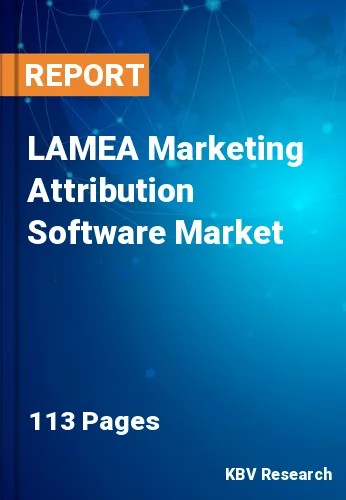The Latin America, Middle East and Africa Marketing Attribution Software Market would witness market growth of 20.1% CAGR during the forecast period (2022-2028).
Attribution metrics provide merchants with a wealth of information to better comprehend consumer behavior across all touchpoints and optimize marketing strategy. Yet not all attributions are equivalent. Frequent flaws in marketing attribution data can mislead merchants into optimizing the incorrect channels and messaging, a blunder that no marketer can afford. Combining offline and online attribution data into a single customer journey perspective is crucial. Retailers who invest in the greatest unified marketing measurement technology, which provides holistic attribution data at the individual level, will build exceptional consumer experiences that generate tangible results from shoppers everywhere they buy.
Hence, the demand for marketing attribution software market is increasing. Marketing managers invest a lot to support and increase their sales, whether through social media marketing, SEO, or content marketing. Marketing solution providers will have an advantage in the age of digitization and aggressive marketing strategies due to data-driven promotion, artificial intelligence (AI), and search engine optimization (SEO). In addition, AI will likely create opportunities for industries, countries, and businesses in the coming years.
Middle Eastern countries already understand the crucial need for digital services adapted to their unique needs. Current laws and regulations are being relaxed to keep up with the shifting market trends. Regulations must be changed to reflect the widespread adoption of cashless transactions. Businesses in South Africa also have a thorough awareness of and analysis of their customers' actions and inquiries. They respond to their clients with the best solutions to fulfill their needs and boost client happiness. It will strengthen their bonds with customers, raise customer satisfaction, and boost brand loyalty, all of which will fuel the expansion of the marketing cloud platform and, in turn, the demand for marketing attribution software.
The Brazil market dominated the LAMEA Marketing Attribution Software Market by Country in 2021, and would continue to be a dominant market till 2028; thereby, achieving a market value of $160.3 million by 2028. The Argentina market is experiencing a CAGR of 20.8% during (2022 - 2028). Additionally, The UAE market would display a CAGR of 19.8% during (2022 - 2028).
Based on Component, the market is segmented into Solution and Services. Based on Type, the market is segmented into Multi-source Attribution, Probabilistic or Algorithmic Attribution and Single-source Attribution. Based on Deployment Mode, the market is segmented into On-premises and Cloud. Based on Organization Size, the market is segmented into Large Enterprises and Small & Medium Enterprises (SMEs). Based on Vertical, the market is segmented into Consumer Goods & Retail, BFSI, Telecom & IT, Healthcare, Travel & Hospitality, Media & Entertainment and Others. Based on countries, the market is segmented into Brazil, Argentina, UAE, Saudi Arabia, South Africa, Nigeria, and Rest of LAMEA.
Free Valuable Insights: The Worldwide Marketing Attribution Software Market is Projected to reach USD 7.2 Billion by 2028, at a CAGR of 13.7%
The market research report covers the analysis of key stake holders of the market. Key companies profiled in the report include Oracle Corporation, Google LLC (Alphabet, Inc.), SAP SE, Adobe, Inc., Merkle Inc. (Dentsu Group Inc.), Neustar, Inc. (TransUnion LLC), HubSpot, Inc., Nielsen Holdings plc (Elliott Investment Management L.P.), Ruler Analytics Limited, and Windsor Group AG
By Component
By Type
By Deployment Mode
By Organization Size
By Vertical
By Country
Our team of dedicated experts can provide you with attractive expansion opportunities for your business.

